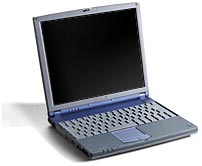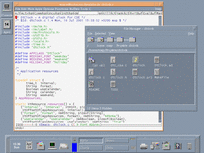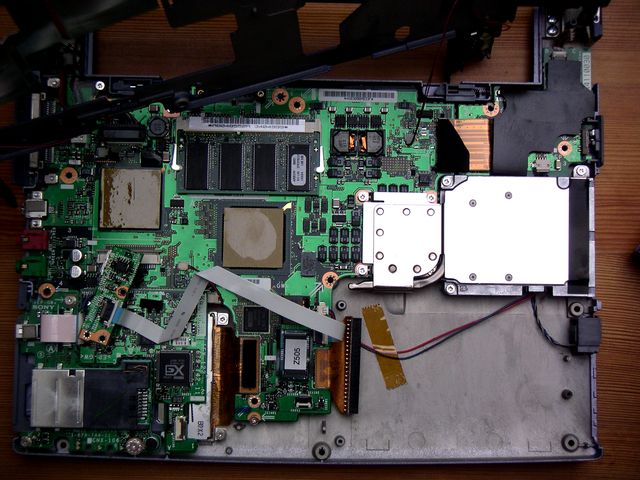About the Machine
The Sony Vaio PCG-Z600LEK has the following features:
- Mobile Intel Pentium III with SpeedStep, 700 MHz
- 12.1" TFT display, 1024 × 768 pixels
- ATI Rage Mobility graphics, 8 MB memory
- 64 MB SDRAM
- 15 GB harddisk
- PCGA-BPZ51A Li-ion battery (2600 mAh)
- PCGA-CD51/A CD-ROM drive, connected via PCMCIA
- PCGA-UFD5 floppy drive, connected via USB
- 10/100Base-T Ethernet (Intel EtherExpress Pro 100)
- i.Link (IEEE 1394, aka Firewire)
- 2 USB connectors
- 1 PCMCIA slot
- Memory Stick slot (it's a USB device)
- Jog Dial
- Microphone and headphone jacks
- 56 Kbit/s soft modem (CONEXANT SoftK56 Speakerphone Winmodem)
- PCGA-UPR5 i.Link port replicator, providing printer, VGA monitor, i.Link, USB, and serial ports
Specs and manuals from a Sony site.
My machine is upgraded to 192 MB RAM. I also have the following accessories:
- PCGA-BPZ52 extended (4200 mAh) battery
- PCGA-DA5 VGA display adapter. This is handy for presentations, since you don't need to carry the port replicator.
The Z600 is a European model; it's identical to the Z505 and N505 models marketed in the U.S. and Japan (inside there's a sticker that says "Z505", so I'm pretty sure now--see the photo below).
Installing an Operating System
The Vaio Z600LEK comes with Windows 2000 Professional. My machine had
been on display and thus had a password set, but the clerks couldn't
remember what it was :-) I don't have a use for Microsoft products
anyway, so I didn't boot into Windows even once (so don't ask me how
the disk was partitioned), and I'm using the whole disk for Linux.
- I first tried a Debian GNU/Linux 3.0 pre-release (from CD-ROM),
but although I could install from the PCMCIA CD-ROM drive by
giving the kernel argument
ide2=0x180, it couldn't find the drive after installation. Furthermore, it didn't recognize the network adapter. (I later found out that it is possible to install Debian, but I didn't want to try again.) - Next I tried FreeBSD 4.4. I used two boot floppies, and it installed without troubles over the network. But: It crashed when the CD-ROM drive is present. There is a patch for this problem (still not in -current) There were also problems with USB after resuming. I also played with -current, which was better in some respects, but there were troubles with power management (slept fine, but didn't wake up), and the CD-ROM didn't work, and in the end I didn't know anymore what worked and what didn't in which release... See below for some related FreeBSD links.
- So I thought I'd give Linux another try. Mandrake 8.1 (over network) hung during the PCMCIA detection (this seems to be a known problem).
- Since it was reported that Red Hat works fine (when giving
the infamous
ide2=0x180argument), I decided to get the distribution on CD-ROMs, since I didn't want to wait for another network install. So, on Saturday, just before the stores were closing, I bought Red Hat 7.1. Since everybody says that you needide2=0x180, I used this option, too--and failed miserably. After much experimentation, I decided to try the "dummy approach": Just press return. So, this time, I didn't enter any options at the boot prompt, and voilà, Red Hat installed perfectly! - I'm currently running Red Hat Linux 7.2 with a vanilla 2.4.20 kernel and DeXtop XiG's great CDE implementation for Linux.
What's Working?
Everything I need was basically working out of the box:
- X Window System
- Networking
- CD-ROM drive
- APM (suspend/resume). The Z600LEK shares an APM BIOS bug with many
other Vaios, causing
apm(1)to report incorrect times. Here's a patch for the Linux kernel (sent to the kernel developers list on 2002-03-23). - Floppy drive and Memory Stick slot. Well, there's one glitch: when mounting them as file systems, they "disappear" after suspending/resuming; they can be unmounted and re-mounted, but mtools are probably currently more practical. I'd guess that this problem is not Vaio-specific, but I don't have any other PC.
- Jog Dial (in the Red Hat kernels, the driver's enabled by default;
I'm using the Jog Dial with
jogdiald.
I don't have any i.Link devices, and I have no idea about support for IEEE 1394 in Linux in general. I don't need the modem, so I haven't tried it either, but despite it being a softmodem it might actually work--check the Linux-sony mailing list archives
Replacing the hard disk
My Vaio (called notus) came with a 15 GB Hitachi DK23BA-15 hard disk. It had been worked fine, until December 31, 2005, when I was suddenly getting read errors and the hard disk started making strange noises. I managed to copy my current work to another system before notus locked up.
On reboot, I got the Non-System disk or disk error message, but on
second try it booted again, and Linux detected lots of file system
errors and dropped me on the command line; while trying to fix the
file system, it locked up again. Eventually the Vaio didn't recognize
the hard disk on startup anymore.
To get access to the hard disk, you have to disassemble the Vaio almost completely. It's not hard, but it's annoying. I didn't need them, but afterwards I found out by chance that there are a number of illustrated guides about opening the Z600/Z505; repair4laptop.org lists:
Anyway, inside (and without a hard disk) the Z600 looks like this:
After dissassembling the Vaio, I put the hard disk in an external USB
enclosure and hooked it up to another machine (a VIA Epia system
running Slackware Linux); I was quite surprised that it mounted the
disk without problems. I used the excellent
dd_rescue to make an image of the whole disk; on the
first try it reported 6 errors, but on the second try it was able to
read the whole disk without errors.
Nevertheless, something was wrong with the disk, so I ordered a new
one, a Samsung MP0402H. Once it arrived, I used dd_rescue again to
write the image to the new disk. I installed the disk in the Vaio,
and it booted up fine again.
There is one oddity: The drive activity light is now continously lit; I rechecked everything and confirmed that I didn't damage anything, and apparently this is normal, see this posting.
Apart from the larger size, the new hard disk is also noticeably quieter and cooler (you feel it under your right hand) than the old one.
FreeBSD VAIO Links
- A program to set the screen brightness
- SPIC driver project
- The PictureBook Jogdial
- FreeBSD-current
- SPIC Driver Project


